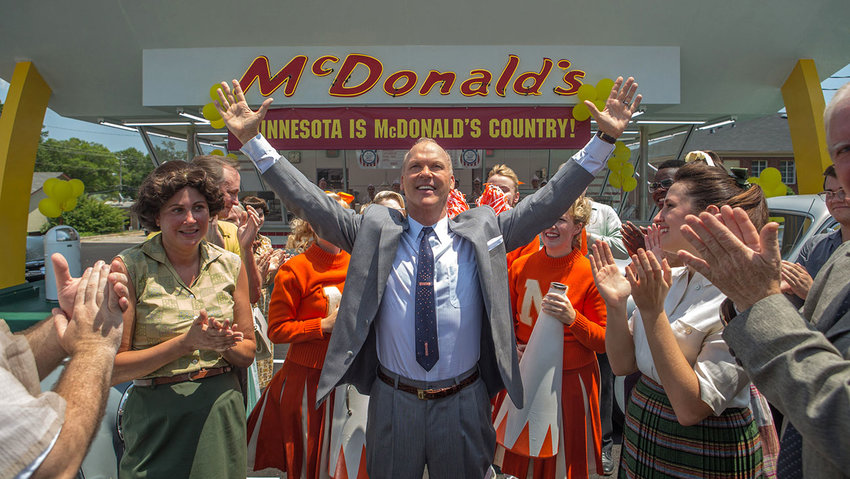
“The Founder” isn’t necessarily a bad movie, but there’s no real reason it needed to be a movie. Nothing about the film’s presentation, the way it delivers its story, justifies its being a narrative feature film. Nothing, that is, besides the desire of its studio and producers to make some easy money with a based-on-a-true-story premise fueled by star power and a connection to the world’s most famous restaurant chain — elements that its intended audience will no doubt devour like a Big Mac. The irony here it that the capitalist motivation for the film’s creation contradicts the films ostensibly anti-capitalist message. Does this inherent hypocrisy make “The Founder” a film unworthy of being seen? Maybe, depending on your principles. In any case, the film is unfortunately too mediocre and uninteresting to spend much time worrying about the answer.
The film opens in 1954, where Ray Kroc (Michael Keaton) is a struggling traveling salesman of Milkshake Mixers. One day, he receives an order for six units of the wildly unpopular product he’s hustling. Surprised, he decides to take a trip to San Bernardino, Calif, to check out the restaurant that placed the order. There he finds a small restaurant called McDonald’s, founded by brothers Dick (Nick Offerman, wonderfully understated and perhaps the films best performance) and Mac McDonald (John Carroll Lynch). Impressed by the restaurants efficiency, popularity and family-friendly atmosphere, Kroc convinces the brothers to franchise the small establishment, with Kroc heading the expansion and the brothers having approval over how each restaurant is run.
It’s no spoiler to reveal that McDonald’s becomes a fast-food empire. Along the way, Kroc becomes very wealthy by repeatedly screwing over nearly everyone in his orbit, including the brothers, his wife Ethel (Laura Dern) and his franchisees. With its critique of greed and American capitalism and its portrait of petulant, success obsessed masculinity, it’s a bit like the television series “Breaking Bad,” just replace blue meth with cheeseburgers and lose the gruesome violence.
But “The Founder” lacks much of what makes “Breaking Bad” work: quality craft. “Breaking Bad” had writing and plotting that are amongst the best any visual medium has seen. Most of Robert D. Seigel’s script for “The Founder” is exposition, recounting facts, dates, names and the intricacies of business and burger preparation with dull dutifulness. And it’s direction, by John Lee Hancock, follows suit.
Looking at almost any given shot of both projects, “Breaking Bad” feels more like a movie, whereas “The Founder” feels more like a TV show. Its bland close-ups and flat medium shots serving as little more than script illustration. When I said earlier that the film doesn’t justify its own existence, I mean that the story could have been told in much the same way, with the same emotions provoked, in a one-hour TV documentary on the founding of McDonald’s, the kind you’re likely to see on PBS. It doesn’t have the ambition or creativity to try to plumb the psychological depths of its characters or to ponder what this story might say about America. It’s little more than information acted out by good-looking famous people.
Support City Pulse - Donate Today!
Comments
No comments on this item Please log in to comment by clicking here